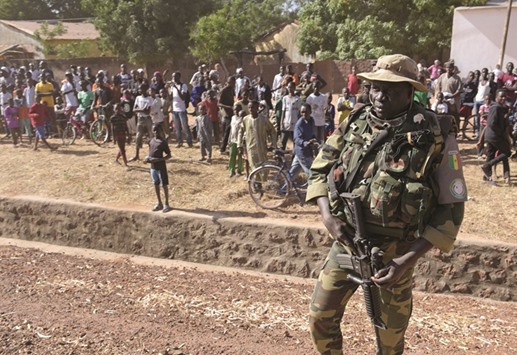Yahya Jammeh, who led Gambia for 22 years but refused to accept defeat in a December election, flew out of Banjul late on Saturday en route to Equatorial Guinea as the regional force was poised to remove him.
Several witnesses in Barra, a town on the opposite bank of the Gambia River from Banjul, saw scores of soldiers massing near a ferry terminal.
“I saw a lot of them. Too many to count,” said Pamadou Joof, 26, who operates a pirogue, a type of small boat. “They had vehicles and a lot of guns.”
The regional operation was launched late on Thursday after Barrow was sworn in as president at Gambia’s embassy in neighbouring Senegal, but it was then halted to give Jammeh one last chance to leave peacefully.
His departure followed two days of negotiations led by Guinea’s President Alpha Conde and Mohamed Ould Abdel Aziz of Mauritania that have prompted speculation over what, if any, terms were agreed to convince him to step down.
Senegalese Foreign Minister Mankeur Ndiaye told Reuters that, while Jammeh had sought a promise of immunity from prosecution, no such guarantee was made.
“President Jammeh and his team concocted a declaration to be endorsed by (regional bloc) ECOWAS, the United Nations and the African Union that gave him every guarantee, essentially impunity,” Ndiaye said.
“This declaration was signed by no one.”
Jammeh’s loss in a December 1 poll and his initial acceptance of the result were celebrated across the tiny nation by Gambians grown weary of his increasingly authoritarian rule.
But he reversed his position a week later, creating a standoff with regional neighbours who demanded he step down.
West African troops from Senegal, Nigeria, Ghana and Mali were deploying throughout Gambia yesterday as part of efforts to secure the country and allow Barrow to take charge.
“We will look for arms caches and detect mercenaries, so that we can restore calm,” said Marcel de Souza, president of the ECOWAS commission, explaining to reporters overnight the new phase of the military operation.
“Adama Barrow hopes to go back as quickly as possible.”
A Reuters witness yesterday saw war planes flying over Banjul, which remained calm despite some concern over how the army, a pillar of Jammeh’s regime, would react to his departure.
Rights groups accuse Jammeh of jailing, torturing and killing his political opponents while acquiring a vast fortune — including luxury cars and an estate in the United States — as most of his people remained impoverished.
The repression has forced thousands of Gambians to seek asylum abroad over the years.
An additional 45,000 people fled to Senegal amid growing fears of unrest in the wake of last month’s election, according to the United Nations.
Hundreds of Gambians carrying sacks, suitcases and cooking pots began returning yesterday by ferry from Senegal’s Casamance region.
Hawa Jagne, 22, a cloth trader, hugged her sister Fama as she stepped off the boat.
“I’m so relieved to see her,” Jagne said. “Everyone is free. You can do whatever you want, because this is a democratic country. You can express yourself. No one can kill you.”

